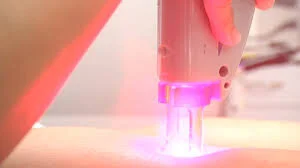Increasing the amount of energy delivered during laser hair removal is a common method of treating patients who complain of insufficient results in a given area. With increased laser energy, the risk of complications does increase, but there is no way to know in advance if the increase in energy will cause an alteration in skin pigment while producing the desired reduction in hair density. Obviously, treatment at an energy level that, previously, did not cause pigment change is a strong indicator that no pigment change will result from subsequent treatments.
Sometimes, however, when a patient perceives that the treatment level is inadequate, the provider will increase the energy level in order to provide greater hair reduction, albeit at the risk of complications, including pigment changes. The laser is unable to distinguish between targets when the skin has levels of melanin pigment that equal the level in the hair. It is incumbent upon a patient who has had pigment changes to treat it in a prescribed manner if she wishes a successful outcome. The use of topical medications to treat the inflammation that is a cause of the pigmentation is well-described and generally produces a satisfactory outcome, if treatment is begun as soon as the problem is identified.
Laser hair removal medical expert witness specialties include plastic surgery and dermatology.

